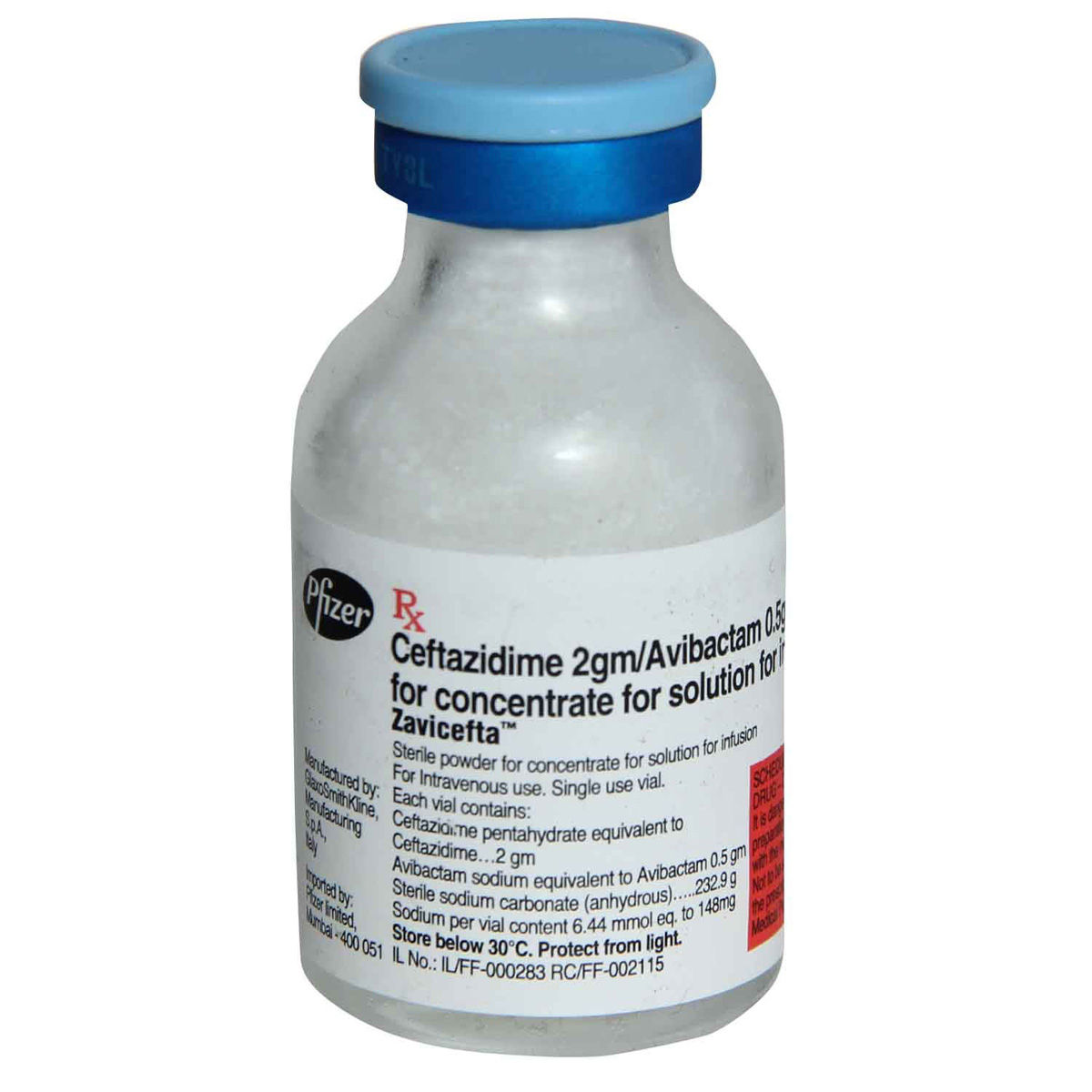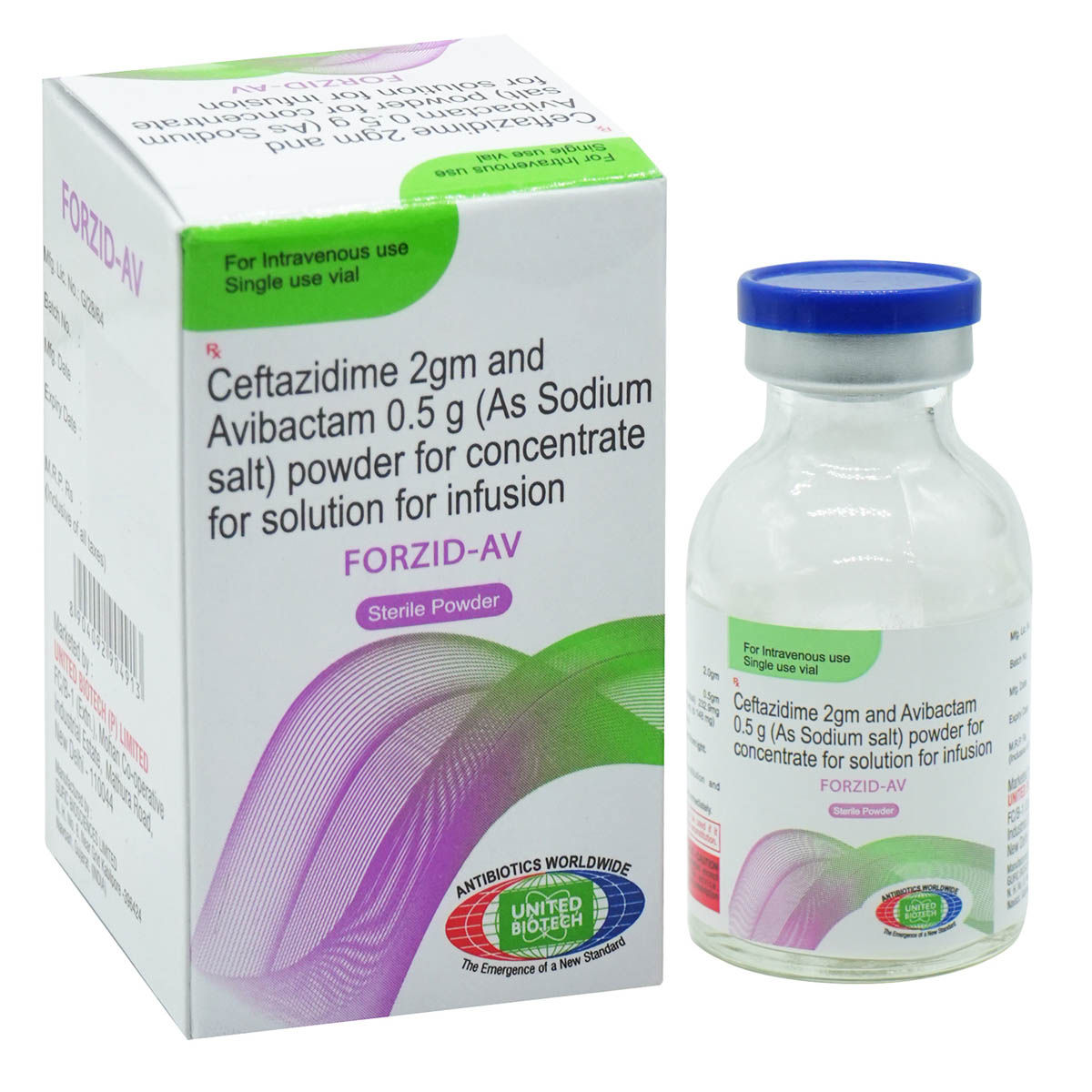Cavim Solution for Infusion 1's

₹5042.2*
MRP ₹6149
18% off
₹5226.65*
MRP ₹6149
15% CB
₹922.35 cashback(15%)
Free Delivery
With Circle membership
(Inclusive of all Taxes)
This offer price is valid on orders above ₹800. Apply coupon PHARMA10/PHARMA18 (excluding restricted items)
Know Your Delivery Time
Provide Delivery Location
Available Offers
 Prescription drug
Prescription drugWhats That

Secure Payment

India's Most Trusted Pharmacy

Genuine Products
Composition :
Manufacturer/Marketer :
Consume Type :
Return Policy :
Expires on or after :
About Cavim Solution for Infusion
Cavim Solution for Infusion belongs to a class of medicines called antibiotics used in the treatment of bacterial infections of the urinary tract, respiratory tract and abdomen. A bacterial infection is a condition in which harmful bacteria grow in the body and cause infection. Bacteremia is the presence of bacteria in the blood.
Cavim Solution for Infusion contains Ceftazidime and Avibactam. Ceftazidime works by interfering with the formation of the bacterial cell wall (a protective covering) that is necessary for their survival. Avibactam decreases bacterial resistance and enhances the activity of Ceftazidime against the bacteria. Together, Cavim Solution for Infusion helps to treat bacterial infections.
In some cases, you may experience redness and swelling at the site of injection, and/or nausea and diarrhoea. Most of these side effects of Cavim Solution for Infusion do not require medical attention and gradually resolve over time. However, if the side effects persist or worsen, please consult your doctor.
If you are allergic to Cavim Solution for Infusion or any other medicines, please tell your doctor. If you are pregnant or breastfeeding, please inform your doctor before taking Cavim Solution for Infusion. Drive only if you are alert as Cavim Solution for Infusion may cause dizziness. Cavim Solution for Infusion should be used with caution in those with renal impairment and Clostridium difficile-associated diarrhoea.
Uses of Cavim Solution for Infusion
Directions for Use
Medicinal Benefits
Cavim Solution for Infusion contains Ceftazidime and Avibactam; they act against both aerobic (grow in the presence of oxygen) and anaerobic (grow in the absence of oxygen) gram-negative and gram-positive bacteria. It is used in the treatment of bacterial infections of the urinary tract, respiratory tract, and abdomen. Ceftazidime inhibits enzymes that regulate the formation of the bacterial cell wall, thereby arresting bacterial development. Avibactam is a beta-lactamase inhibitor. Beta-lactamase is an enzyme that inactivates antibiotics and builds up a drug resistance. By inhibiting beta-lactamase, avibactam makes the bacteria more susceptible to antibiotic action. Cavim Solution for Infusion damages the bacterial cell wall, kills bacteria and makes the bacteria more sensitive to the action of the antibiotic. Hence Cavim Solution for Infusion finds widespread use in treating complicated bacterial infections.
How Cavim Solution for Infusion Works
Storage
Side Effects of Cavim Solution for Infusion
- Redness and swelling on injection site
- Diarrhoea
- Dizziness
- Nausea
What if I have taken an overdose of Cavim Solution for Infusion
Drug Warnings
If you are allergic to Cavim Solution for Infusion or any other medicines, please tell your doctor. If you have kidney problems or diabetes, inform your doctor before taking Cavim Solution for Infusion. Consult your doctor if you are pregnant or breastfeeding. If you are on a controlled sodium diet, inform your doctor before taking Cavim Solution for Infusion. Cavim Solution for Infusion should not be administered if you are currently on any vaccinations or are scheduled for the same. If you have a widespread rash with peeling skin and blisters, please consult a doctor immediately as these might be signs of Stevens-Johnson syndrome. Drive only if you are alert as Cavim Solution for Infusion may cause dizziness. You are recommended to complete the full course of Cavim Solution for Infusion as prescribed by your doctor for effective results.
Drug-Drug Interactions
Drug-Drug Interactions
Login/Sign Up
When BCG vaccine is used with Cavim Solution for Infusion 1's, its effectiveness may be reduced.
How to manage the interaction:
Taking Cavim Solution for Infusion 1's with BCG vaccine is not recommended, but can be taken together if prescribed by a doctor. In case you experience any unusual side effects, consult a doctor. Do not discontinue any medications without consulting a doctor.
Taking the cholera vaccine after or along with Cavim Solution for Infusion 1's may reduce the activity of the vaccine.
How to manage the interaction:
Although there is a possible interaction between Cavim Solution for Infusion 1's and Cholera vaccines, you can take these medicines together if prescribed by your doctor. You should wait at least 14 days after finishing your antibiotic treatment before receiving the cholera vaccine in order to ensure an appropriate immune response. Do not stop using any medications without consulting a doctor.
Taking the cholera vaccine after or along with Cavim Solution for Infusion 1's may reduce the activity of the vaccine.
How to manage the interaction:
Although taking Cavim Solution for Infusion 1's with Cholera, live attenuated can possibly result in an interaction, but it can be taken if your doctor has advised it. You should wait at least 14 days after finishing your antibiotic treatment before receiving the cholera vaccine in order to ensure an appropriate immune response. Do not stop using any medications without a doctor's advice.
Drug-Food Interactions
Drug-Food Interactions
Login/Sign Up
Diet & Lifestyle Advise
- Take probiotics after completing the full course of Cavim Solution for Infusion to restore some healthy bacteria in the intestines that may have been killed. Taking probiotics after antibiotic treatment can reduce the risk of antibiotic-associated diarrhoea. Certain fermented foods like cheese, yoghurt, kombucha, sauerkraut and kimchi can help to restore the good bacteria of the intestine.
- Include fibre-rich foods, as they can be easily digested by your gut bacteria, which helps stimulate their growth. Whole grains such as whole-grain bread, brown rice should be included in your diet.
- Make sure you drink plenty of water or other fluids every day while you are taking Cavim Solution for Infusion.
- Avoid alcohol consumption as it may increase adverse effects.
Habit Forming
Therapeutic Class
Cavim Solution for Infusion Substitute

Zavicefta Injection 1's
by AYUR
₹4966.70per tabletCipcza 2.5 gm Infusion 1's
by Others
₹1901.70per tabletAvictum 2.5 gm Injection 1's
by Others
₹4466.50per tabletZidavi Infusion 1's
by Others
₹2435.40per tabletZeftabac Injection 1's
by Others
₹4059.00per tablet
Product Substitutes
Alcohol
Caution
The interaction of Cavim Solution for Infusion with alcohol is unknown. Please consult a doctor before consuming alcohol while using Cavim Solution for Infusion.
Pregnancy
Caution
Please consult a doctor if you are pregnant or planning for pregnancy. Your doctor will prescribe only if the benefits outweigh the risks.
Breast Feeding
Caution
Cavim Solution for Infusion may be excreted in human milk in small amounts. Therefore, it is given to breastfeeding mothers only if the doctor thinks benefits are greater than risks. Please consult a doctor if you are breastfeeding.
Driving
Caution
Cavim Solution for Infusion may cause dizziness. Therefore, avoid driving if you feel dizzy after taking Cavim Solution for Infusion.
Liver
Caution
Take Cavim Solution for Infusion with caution, especially if you have a history of liver diseases/conditions. The dose may be adjusted by your doctor as required.
Kidney
Caution
Take Cavim Solution for Infusion with caution, especially if you have a history of kidney diseases/conditions. The dose may be adjusted by your doctor as required.
Children
Caution
Cavim Solution for Infusion should be used in children only in doses as prescribed by a doctor. Cavim Solution for Infusion is not recommended for use in children below 3months.
FAQs
Country of origin
Manufacturer/Marketer address
Disclaimer
Author Details
We provide you with authentic, trustworthy and relevant information
Reference
- https://journals.asm.org/doi/full/10.1128/AAC.03057-14
- https://www.medicines.org.uk/emc/medicine/33061#gref
- https://en.wikipedia.org/wiki/Ceftazidime
- https://www.ema.europa.eu/en/documents/product-information/zavicefta-epar-product-information_en.pdf
- https://en.wikipedia.org/wiki/Ceftazidime/avibactam
- https://pubmed.ncbi.nlm.nih.gov/29671219/
- https://www.avycaz.com/
- https://www.accessdata.fda.gov/drugsatfda_docs/label/2015/206494s000lbl.pdf
- https://pubmed.ncbi.nlm.nih.gov/25022578/#:~:text=Avibactam%20has%20an%20unusual%20mechanism,inhibitors%2C%20this%20reaction%20is%20reversible.
- https://journals.asm.org/doi/full/10.1128/AAC.03057-14
- https://www.medicines.org.uk/emc/files/pil.275.pdf
- https://www.drugs.com/cdi/ceftazidime.html
- https://www.webmd.com/drugs/2/drug-1769/ceftazidime-injection/details
- https://www.webmd.com/drugs/2/drug-167890/ceftazidime-avibactam-intravenous/details














